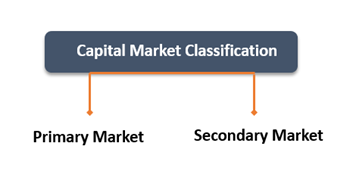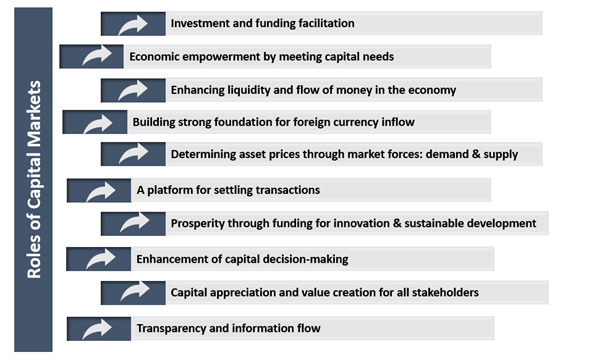What are Capital Markets?
Capital markets are the lifeline of an economy that facilitates funding for Government, corporations, and other institutions. Moreover, capital markets are funding infrastructure for the economy, therefore lifeline.
Savings and investments are channelised to those in need of funding in capital markets. Investors and savers can include households and institutions, while capital seekers primarily include Governments, corporations, and institutions.
Capital markets are the place where securities are exchanged between two parties. These securities incorporate equity, bonds, preferred shares, derivatives, commodities etc. Almost all financial instruments are traded in capital markets.

Kalkine image
Primary Market Vs Secondary Market
Primary market is only concerned with the new issuance of securities. The moment security is exchanged between two parties after the initial issue, it happens in the secondary market. A company’s going public move is started through a primary market, where it directly sells securities to specific investors whereas once a company is public, it sells its securities (shares, bonds etc) to a large number of investors through the secondary market.
Investment banks provide primary market services to capital seekers. A firm selling a bond goes to investment banks for underwriting, pricing, and listing of the security. Likewise, an initial public offering is also facilitated by investment banks for privately held enterprises looking for multiples.
Market makers, brokers and dealers facilitate the secondary market for securities. Mostly these market participants are investment banks, but there are plenty of individual companies too providing secondary market services.

Kalkine Image
What are the types of capital markets?
Stock market
Also known as equity market, the stock market is the most popular capital market due to accessibility of investments. The liquidity levels in stock market are usually high, given the scale of market participants.
Equity as an asset class has never faded for investors seeking capital appreciation. Stocks represent an ownership stake in the company, and stockholders have voting right on the decisions of the firm. A considerable portion of investors also includes households.
Bond market
Debt market provides large scale funding sources to an economy and is very crucial for economic development. Countries issue bonds in the debt market to fund their ambitions, while corporations and institutions have a similar intent.
Bonds as an asset class is considered as safe because of regular interest payments on the principal amount as well as repayment of principal at the time of maturity. The risk of non-repayment of interest and principal is always present.
Government bonds are considered as safest investments in the debt market, and yields on Government bonds depict the risk-free rate at a given point in time. Corporate debt is second to sovereign debt and is relatively riskier than the latter, therefore carries a higher interest rate.
Commodity market
Commodities are crucial for the global economy and have been factors of production in many industries. Unlike debt or equity, commodities have a movable presence and are traded extensively across global markets.
As a resource, commodities have tangible demand and supply dynamic and are priced through these two market forces. While there are several types of publicly traded commodities, the popular ones include gold, silver, iron ore, coal, barley, grain, crude oil, platinum etc.
Foreign exchange (FX) market
The FX market is an essential part of capital markets, facilitating global trade and cross-currency flows across jurisdictions. Currencies and associated products are traded in the FX market.
This market determines the exchange rate between the currencies of two countries. FX rate or exchange rate is evaluated based on the cross-comparison of various variables of two nations, including purchase power parity, the balance of payments, interest rates, inflation, GDP growth etc.
Derivative market
A derivative is a contract between two parties with an underlying asset, which would be exchanged on a specified future date at a pre-determined price.
The value of a derivative contract changes consistently with the change in the value of the underlying asset. But the magnitude of change in the value of the derivative contract would be in multiples compared to change in the value of an underlying asset.
The underlying asset to a derivative could be equity, bonds, commodity etc. Derivative also include structured products like total return swap, interest rate swap, swaptions, options, FX swaps etc.
Private market
A private market is a place where securities are exchanged privately between parties. Companies, before going public, trade in private markets. Private markets remain crucial for the development of new businesses and entrepreneurs.
Businesses may experience significant capital activity in the private market. Private equity and venture capital are the prime examples of private market investors, seeking to invest in start-ups, ideas, and budding stories.
Public market
Public market is extremely transparent than the private market. In the public market, the investor base is large, and the information flow is extensive. All markets discussed above, except the private market, falls under the public market.
 Please wait processing your request...
Please wait processing your request...